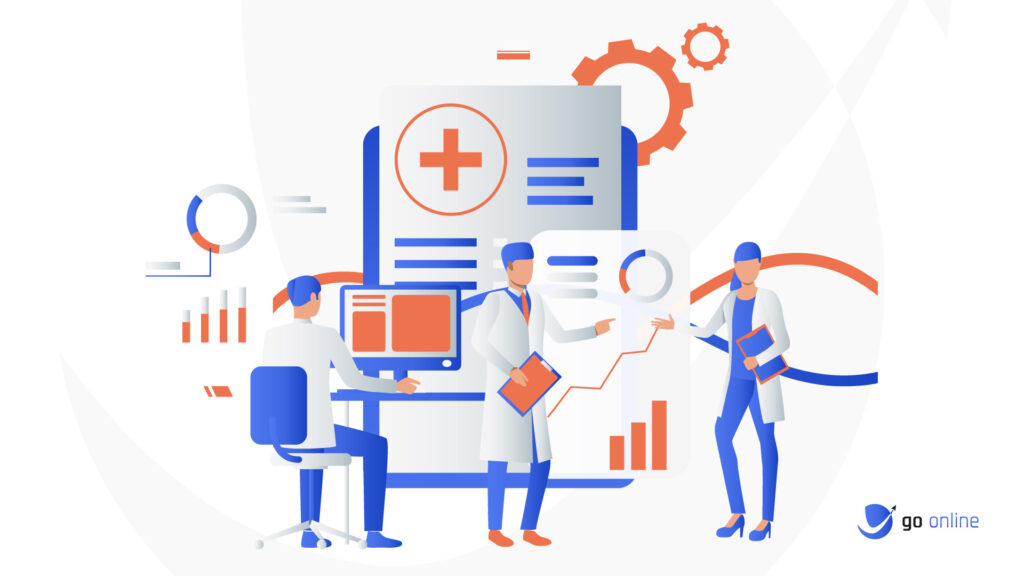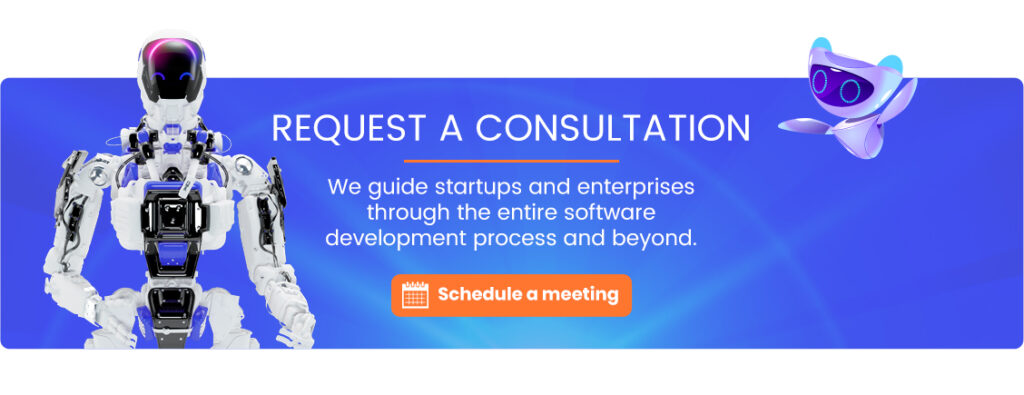We believe that intelligent automation in healthcare sector has the potential to revolutionize the delivery of medical services and patient outcomes, which can result in improved performance in a shorter period of time by reducing manual processes and repetitive tasks, which is something that may be life-saving.
What Is Intelligent Automation In Healthcare?

We can improve Healthcare-related activities through the deployment of intelligent automation. This involves the integration of advanced technologies including AI, machine learning, robotic process automation, natural language processing, and computer vision for the automation of healthcare processes. This covers a wide range of tasks we now do manually, from administrative tasks such as scheduling appointments, patient management, medical billing, and managing medical documents to clinical procedures like diagnosing illness and tracking patients.
Why Is Intelligent Automation In Healthcare Beneficial For Healthcare Providers?

Healthcare providers can benefit greatly by utilizing intelligent automation in the current environment of increasing chronic diseases, elderly populations, and the heightened demand for healthcare. Despite the advantages that Smart Tech brings, there are a few issues like patient data safety, the requirement for competent personnel, and the inflexibility of certain solutions that must be considered. However, with the correct implementation and training, Smart Tech can be a very helpful tool in improving the quality of our healthcare services.
We use innovative technologies in many aspects of the medical industry, and there are numerous examples of automation in healthcare such as diagnosis, treatment, prevention, and recovery. Let us explore some more examples that demonstrate the use of intelligent automation:
- Monitoring devices such as wearables and health sensors can track vital signs and alert us, healthcare professionals, to potential risks.
- Mobile apps that allow patients to monitor their health and communicate with healthcare providers remotely.
- Smart hospital beds can adjust to a patient’s needs and provide real-time data on their condition.
- Remote healthcare systems allow us to communicate with our patients and monitor their health from a distance.
- Monitoring systems that use artificial intelligence to analyze patient data and identify potential health risks.
What Is An Example Of Artificial Intelligence In Healthcare?

The 2020 pandemic is a perfect illustration of where automated workflows could have been extremely advantageous. This clearly demonstrates how vital it is for us to use intelligent technologies in patient care, as healthcare facilitiesaround the globe have been pushed to their maximum capacity.
The Benefits If Automation In Healthcare

There are numerous benefits of using intelligent automation in healthcare industry such as:
- Increased efficiency and quality of care: Automated healthcare solutions can help us, healthcare providers,streamline our workflows and reduce the time and effort required for repetitive tasks, allowing us to focus more on patient care.
- Reduced costs: Artificial intelligence healthcare systems can help healthcare organizations save money by reducing the need for human intervention and improving the accuracy of clinical outcomes.
- Improved patient experience: Robotic process automation can improve the patient experience by reducing wait times, improving the accuracy of patient data, and enabling us to provide more personalized care.
- Better patient outcomes: Automation can help us identify potential health risks and diagnose diseases earlier, leading to better patient and clinical outcomes.
When Is It worth Implementing Intelligent Automation In Healthcare?

By including technologies like robotics and artificial intelligence, intelligent automation has a great potential to bring us numerous significant benefits to the healthcare industry. Let’s take a look at some scenarios where it might be worth implementing intelligent automation in our processes:
Repetitive And Routine Tasks
We can use automation to automate repetitive tasks, such as data entry or schedule appointments, freeing up our time to focus on more complex tasks that require human intervention.
Diagnostic And Treatment Decisions
AI-powered tools can analyze large amounts of data to help us, as healthcare providers, make more accurate and timely diagnostic and treatment decisions.
Monitoring And Surveillance
We can use automation to monitor patients in real time, allowing us to quickly respond to changes in patient conditions.
Personalized Medicine
AI-powered algorithms can help us, healthcare providers, to tailor treatments to individual patients based on their unique genetic makeup, medical history, and lifestyle factors.
Administrative Tasks
Automation can help us streamline administrative operations, such as billing and insurance processing, appointment reminders, and data collection while reducing the time and resources we normally need to complete these tasks, producing fewer errors.
Let’s Take A Look At Some Examples Of Using Smart Tech In Healthcare
There are so many ways we can use automation in healthcare industry in order to improve healthcare, improve our efficiency, and reduce costs. For example:

We commonly use wearable devices, such as smartwatches and fitness trackers to monitor vital signs and track patients’ health status. This can help us, healthcare providers, detect potential health problems early on and react in a timely manner.

Remote monitoring technologies, such as telemedicine and virtual visits, enable us, as healthcare providers, to monitor patients remotely and provide patient care outside of traditional clinical settings. This can be especially helpful for patients in rural areas or those with mobility issues.

EHRs are digital records of patients’ medical histories that we, healthcare providers, can access across different settings. This helps us improve communication and coordination of care between providers, reduce human errors, and improve patient outcomes.

We can use robotics to automate routine tasks, such as medication delivery and patient transport, freeing our schedules, and allowing us as healthcare providers to focus on more complex tasks.

We can use 3D printers to create customized prosthetics, implants, and surgical instruments, reducing the time and leaving with lower costs associated with traditional manufacturing methods.

Manual work in healthcare facilities and pharmaceutical inventories is very time-consuming, but the modern worldallows us to automate processes like inventory management which reduces human errors and gives us time to focus on more important tasks, leaving us with improved efficiency and overall better clinical outcomes.
What Is Automation In Hospitals?

Hospital automation refers to the use of technology and advanced automation solutions to automate various processes and tasks within a hospital setting. The goal of hospital automation is to improve the quality of patient care, it results inimproved efficiency, can reduce human error, and lower costs. For example:
Smart hospital beds: These are a type of medical bed that is equipped with advanced features and technologies to improve patient care and safety, as well as improved efficiency for healthcare providers. Equipped with sensors and monitoring devices to track patients’ vital signs, position, and movement, these beds can help us detect changes in a patient’s condition and respond in a timely manner.
Smart hospital beds can be designed with pressure-relieving features, such as air or foam mattresses, to reduce the risk of pressure ulcers or bedsores, providing better clinical outcomes. Equipped with sensors and alarms that inform us when the patient is trying to get out of bed, it improves patient safety and results in better patient satisfaction and overall higher care quality.
Remote healthcare platforms, also called telehealth or telemedicine platforms, another part of healthcare process automation, are digital technologies that enable us to deliver healthcare services remotely. They include video consultation which allows us to speak with patients in real time from the comfort of their own homes. Also, mobile health apps which enable patients to track their health status, monitor their vital signs, and receive personalized health advice, they’re even fun to use, resulting in higher patient engagement.
Monitoring systems in healthcare refer to technologies that are used to track and analyze patient data, such as vital signs or medication adherence, to improve patient outcomes and ensure we give good quality of care.
Vital signs monitoring systems track patients’ heart rate, blood pressure, respiratory rate, and other vital signs, providing us, healthcare providers, with real-time data on patients’ health status. Blood glucose monitoring systems track patients’ blood glucose levels, which is especially important for patients with diabetes or other metabolic disorders.
Challenges Related To The Implementation Of Smart Tech In Healthcare

Despite the numerous benefits of intelligent automation in healthcare industry, we also face some challenges to implementing these technologies in our everyday work, including:
Data Privacy And Security Requirements
Healthcare providers must ensure that patient data is protected and comply with regulations such as HIPAA compliance.
Training Requirements For Medical Staff
As healthcare professionals, we must be trained to use smart technologies effectively and safely.
Challenges Related To Integration And Scaling
Integrating and scaling smart technologies can be complex and require significant investment in infrastructure and training.
Future Opportunities Related To Intelligent Automation In Healthcare

As advanced technologies keep on advancing, the possibilities for intelligent automation in healthcare sector remain on the rise. Such technologies possess the capability of revolutionizing our healthcare by bettering patient results, cutting down expenses, and offering more individualized treatment. Several upcoming opportunities related to intelligent automation in healthcare are:
Continued Development Of Artificial Intelligence And Machine Learning
These technologies have the potential to revolutionize diagnostics and treatment by analyzing patient data and providing us with insights into potential health risks.
Increased Use Of Robotic Process Automation
RPA can help us as healthcare providers to automate administrative tasks such as claims processing and revenue cycle management, reducing the need for human intervention and improving accuracy.
Expansion Of Telemedicine And Remote Healthcare
Telemedicine and remote healthcare platforms can help us as healthcare providers reach our patients in remote or underserved areas and improve access to care.
Training Medical Staff To Use Automation In Healthcare

Healthcare process automation requires training of medical staff to be able to use this type of technology effectively and safely. Before we start the training, it’s important to identify our specific training needs by assessing our current level of knowledge and skills as well as the specific automation technology that will be used.
Once we identify what our training needs are, we can start developing training materials to address these needs. We should tailor these needs to specific members of our staff and should include information on automation technologybeing used, as well as how to use it effectively and safely.
Hands-on training is an effective way to ensure that we, as medical professionals, are comfortable using this automation in clinical trials. After the training has been completed, it’s important to evaluate its effectiveness through surveys or by monitoring the use of the automation technology over time.
Will Intelligent Automation In Healthcare Cause You to Lose Your Job?

Despite the fact that the implementation of artificial intelligence in healthcare can cause some positions to be eliminated, it is also resulting in the formation of new jobs for healthcare workers. We can use intelligent software to diagnose illnesses, identify possible health problems, and keep track of patients, thus allowing us for enhanced care levels while reducing expenditures.
By introducing intelligent automation in healthcare sector, it is possible to free up time for healthcare professionals so that we can concentrate on activities that require human intervention, for example, talking to patients and making important judgments.
Utilizing intelligent automation can make our administrative tasks, such as schedule appointments and managing documents, more productive, lessening the amount of work healthcare professionals have to do and allowing us more time to devote to tasks that involve direct patient care.
Additionally, the realm of intelligent automation in healthcare is generating new job possibilities. There is a growing requirement for people with expertise in data analytics, AI, and machine learning to deploy and put into practice these technologies in healthcare contexts.
What Are The Advantages And Challenges Of Using Smart Tech In Healthcare?

The implementation of advanced technologies such as artificial intelligence, machine learning, and robotic process automation (RPA) in the healthcare sector has the capacity to revolutionize our delivery of services, and enhance patient outcomes. These technologies can help us automate and expedite numerous healthcare processes, ranging from administrative tasks to medical techniques.
Intelligent automation in this industry has a number of advantages, such as greater efficiency and quality of care, reduced costs, improved patient experience, and better patient outcomes. Nevertheless, the deployment of these technologies also brings forth certain challenges, like data security and privacy regulations, training needs for our medical personnel, and difficulties with integration and expansion.
Intelligent automation has the potential to revolutionize the healthcare industry. This could include furthering the development of AI and machine learning, leveraging robotic process automation more frequently, and extending telemedicine and remote healthcare. Although this could lead to some job loss, it could also open up new positions in the healthcare field for us and allow us to focus on tasks that need our expertise. All in all, intelligent automation in healthcare has the ability to improve the quality and availability of healthcare while reducing costs.








